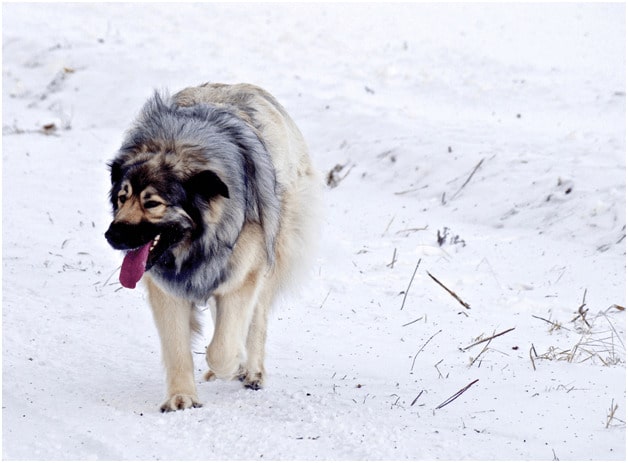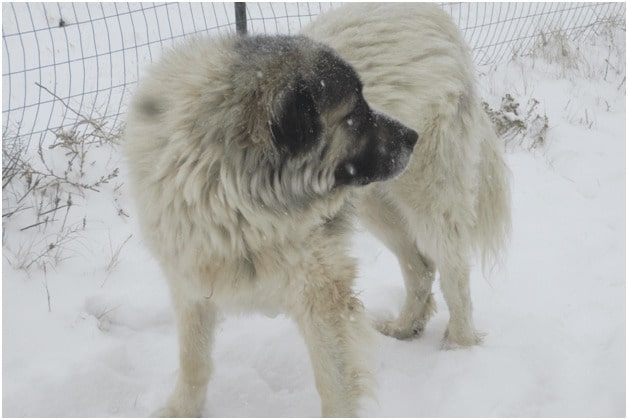If you own a Great Pyrenees, you may have noticed they like to howl. This is actually quite common among this breed of dog. We explore this behavior in detail and identify methods to reduce this behavior.
Great Pyrenees howl for many reasons, including when they are lonely or bored, fearful of others or in pain. They also howl in response to high-pitched noises and to scare off predators. Other reasons include frustration due to not receiving enough exercise or because of separation anxiety.
In order to stop this behavior, it is important to understand the triggers so that preventative measures can be put in place to help your Great Pyrenees. Let’s look at the 8 key reasons for this behavior!
Why Does My Great Pyrenees Howl?
The most common reasons why this breed of dog may howl are given below.
1. Loneliness
If your Great Pyrenees are left alone for long periods, they may start to howl out of loneliness. This is because they are social creatures that thrive on companionship.
To prevent this, make sure to provide plenty of attention and exercise for your dog when you are home.
You may also think about buying another dog as a companion for your Great Pyrenees. It is important to note that two dogs may not be enough to prevent howling behavior.
If your dog is left alone often, their howling is most likely due to loneliness.
2. Boredom
If your dog is left alone in the house all day, it may start to howl out of boredom. A perfect way to stop this from occurring is to provide toys and activities for your dog to keep them occupied.
You can also take the dog outside on walks or play with them in the yard to help keep them entertained.
It is necessary to ensure that the dog gets enough mental and physical stimulation every day. This will help to curb any unwanted behaviors, such as howling.
3. Fearfulness
Some dogs may start to howl when they are afraid or anxious. This might be a crucial sign that your dog is uncomfortable in certain situations.
If you think this may be the case, working on helping your dog feel more comfortable in these situations is important.
You can do this by exposing them to different environments and training them with basic obedience commands.
Providing plenty of love and attention to your dog is also important. This will help them feel safe and secure.
4. Not Getting Enough Exercise

If the dog is not able to get enough exercise, it may start to howl out of frustration. This is because they have a lot of energy that needs to be released.
To prevent this from happening, ensure your dog has plenty of opportunities to run and play. You can do this by taking them on walks, runs, and trips to the park.
It is also important to ensure your dog gets enough mental stimulation. This can be done by playing games with them or giving them puzzle toys to play with.
5. They Are Injured or In Pain
If your dog is howling and seems to be in pain, it is important to take them to the veterinarian for a check-up. They may be injured or have a medical condition that is causing them discomfort.
It is important to get your dog checked out by a professional if you are concerned about their health. They may need proper medication or treatment to help relieve their pain.
6. They Are from Suffering Separation Anxiety
If your dog is howling when they are alone, it may be suffering from separation anxiety. This is a condition where the dog becomes anxious and stressed when they are away from its owner.
If you think that your pet dog may have separation anxiety, it is important to talk to your veterinarian about treatment options. There are many different ways to help a dog with separation anxiety, so do not hesitate to ask for help.
If you leave the home frequently and for long periods, it may be necessary to get another dog as a companion for your Great Pyrenees. This could assist in reducing their levels of separation anxiety.
7. They Are Responding to High-Pitched Noises
Some dogs may start to howl when they hear high-pitched noises, such as sirens. This is because these sounds are similar to the ones that wolves make.
If you think your dog is reacting to high-pitched noises, it is important to try and desensitize them to these sounds.
You can carry this out by playing recordings of these noises at a low volume and gradually increasing the volume over time.
Watch Snowy the Great Pyrenees reacting to the sound of sirens below!
8. To Announce Their Territory and Scare off Predators
One of the most common reasons why dogs howl is to announce their territory and scare off predators. This is a natural instinct that all dogs have.
If you think your dog is howling for this reason, it is important to ensure they are properly trained, so they do not become a nuisance to your neighbors.
It is also important to keep your dog secured in a fenced-in yard or on a leash when outside.
What Should I Do About My Great Pyrenees Howling?
If you think your dog is howling for any of the reasons listed above, it is important to take action. For example, if the dog is howling out of boredom, make sure to provide them with plenty of toys and activities.
If the dog is howling because they are afraid or anxious, work on helping them feel more comfortable in different situations.
If the dog is howling because they are not getting enough exercise, ensure they have plenty of opportunities to run and play.
Talk to your veterinarian about treatment options if you think your dog may have separation anxiety. And if you think your dog is howling because they hear high-pitched noises, try and desensitize them to these sounds.
By taking action and addressing the root cause of your dog’s howling, you can help to reduce or stop this behavior altogether.
Remember, it is important to be patient and take things slow, as change will not happen overnight.
You can help your dog overcome their problem behaviors and live a happy and healthy life with little patience.
Do the Great Pyrenees Howl More Than Other Large Dog Breeds?

Some large dog breeds may howl more than others. However, the Great Pyrenees is known to be a breed that has a high propensity for howling.
If you are concerned about your dog’s howling and want to know if it is excessive for their breed, it is best to talk to your veterinarian about this. They will be able to give you some insight and help you determine if there is cause for concern.
The Great Pyrenees are known for their loyalty, intelligence, and gentle nature. However, one of the less desirable traits of this breed is its propensity for howling.
If you own a Great Pyrenees, it is important to understand why they may howl and what you can do about it. By taking action and addressing the root cause of your dog’s howling, you can help to reduce or stop this behavior altogether.
With time and hard work, you will be able to help your dog overcome their problem behaviors while living a happy and healthy life.
You may be interested in – The Ultimate Great Pyrenees Guide – All Questions Answered!

